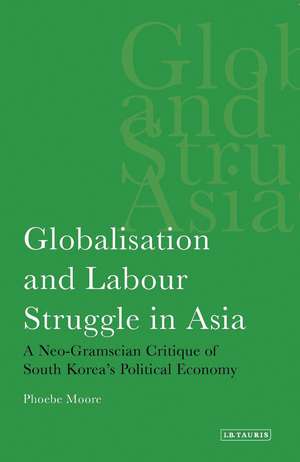Globalisation and Labour Struggle in Asia: A Neo-Gramscian Critique of South Korea's Political Economy
Autor Phoebe Mooreen Limba Engleză Paperback – 5 noi 2012
Preț: 214.31 lei
Preț vechi: 258.08 lei
-17% Nou
Puncte Express: 321
Preț estimativ în valută:
41.01€ • 43.04$ • 34.04£
41.01€ • 43.04$ • 34.04£
Carte tipărită la comandă
Livrare economică 11-25 aprilie
Preluare comenzi: 021 569.72.76
Specificații
ISBN-13: 9781780760339
ISBN-10: 1780760337
Pagini: 248
Dimensiuni: 138 x 216 x 23 mm
Greutate: 0.18 kg
Editura: Bloomsbury Publishing
Colecția I.B.Tauris
Locul publicării:London, United Kingdom
ISBN-10: 1780760337
Pagini: 248
Dimensiuni: 138 x 216 x 23 mm
Greutate: 0.18 kg
Editura: Bloomsbury Publishing
Colecția I.B.Tauris
Locul publicării:London, United Kingdom
Notă biografică
Dr Phoebe Moore is Lecturer in International Relations and International Political Economy in the School of English, Sociology, Politics and Contemporary History at the University of Salford. She is Convenor for the International Political Economy Group, part of the British International Studies Association started in the Royal Institute of International Affairs at Chatham House. She holds a PhD in International Relations from the University of Nottingham.
Cuprins
Introduction1. Why 'IR'? Why Gramscian 'IPE'?2. History of World Orders: International Struggles for Hegemony3. Korea's History of Passive Revolution4. Crisis Response and IMF Restructuring: Passive Revolution in the Knowledge Economy5. Conclusion
